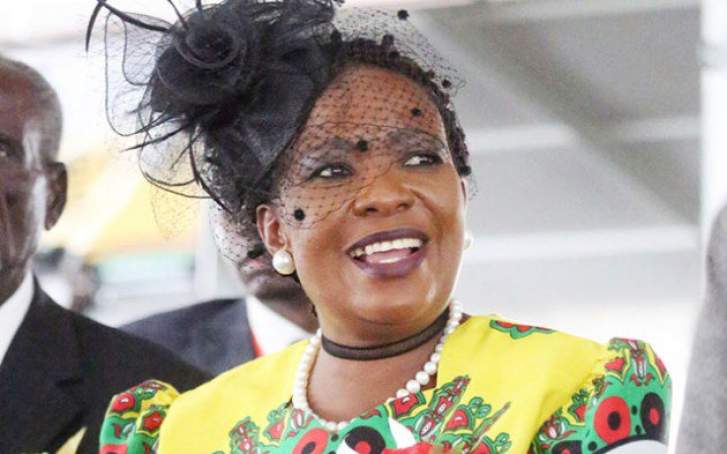NCD recognises Zimbabwe First lady for her philanthropic work

Current First Lady Auxilia Mnangagwa
A United Kingdom-based organisation – NCD Global Alliance which fights non-communicable diseases (NCDs) has written to the First Lady Auxillia Mnangagwa inviting her to join their organisation as an NCD champion in recognition of her unwavering efforts of ensuring citizens are screened and commence treatment early for various ailments.
It is joyous that NCD Global Alliance called in the hard working First Lady to be part of their all-encompassing initiatives a move which shows that works she is doing in the country are receiving international recognition.
The organisation’s chief executive Katie Dain said they recognised the First Lady’s powerful actions on NCDs thereby enlisting her services to spearhead the fight.
Amai Mnangagwa, who is working hard to ensure citizens have access to quality healthcare, said there was need to raise community awareness on NCDs and mobilise citizens to utilise screening, prevention and treatment services early.
She has been working with various communities including the elderly and those living with disabilities among other groups advocating regular health checks so that no one is left behind.
So passionate about the health of citizens is the First Lady with her Angel of Hope Foundation’s mobile clinic traversing the length and breadth of the country with a team of medical experts to screen men and women of cancers and doing checks for other NCDs.
NCD Global Alliance said it recognised the First Lady’s powerful actions on NCDs to date and her contribution in ensuring progress on NCDs so that all people in communities and global community can live longer, healthier lives.
In a statement last week to mark the Global Week for Action on NCDs, the First Lady said it was critical to ensure policymakers and stakeholders commit and disburse resources and she was glad to play a part in this together with the global community working on NCDs.
Since becoming the First Lady of Zimbabwe, Amai Mnangagwa said she has been working very hard to address the gaps and disparities pertaining to utilisation of health services by children, adolescent girls and women.
“I have led campaigns to get women screened and treated for cancer and pregnant women to be HIV tested for their own health and that of their babies. I advocated for Human Papiloma Virus (HPV) where more than 800 000 girls between the ages of 10 to 14 years were vaccinated.
“My work has also included campaigns about Covid-19 and advocacy against child marriages, which put young girls at the risk of acquiring both HIV and cervical cancer,” she said.
The mother of the nation said the focus of her work broadened when she was appointed Vice President of the Organisation of African First Ladies for Development (OAFLAD), with a mandate to spearhead the Free to Shine campaign, which is an initiative of the African Union, OAFLAD and partners.
Zimbabwe, the First Lady said, continues to battle the HIV epidemic, which remains a major public health threat.
“Without doubt we have made progress over the years as seen in the recent achievement of the 90-90-90 targets. Nearly 1,2 million people living with HIV are now on ARVS and the majority are virally suppressed. As more people age with HIV, they now face challenges of morbidity and mortality from non-communicable diseases (NCDs) that include cancers, heart disease, stroke, diabetes and metabolic complications, renal disease, liver disease, and mental illness that increase with age and may be related to HIV and treatment side effects, with more women being at high risk,” she said.
Current work in Zimbabwe under the Ministry of Health and Child Care, she said, includes surveillance on NCDs, to enable crafting of relevant policies and strategies and interventions, the implementation of the National Cancer Control and Prevention Strategy, the provision of the quality eye care services in schools under the CBM-Peek Zimbabwe Project as well as development of standard treatment guidelines and decentralisation of diabetes services to rural health facilities.
“Although funding for NCDs has slightly increased over the years, it remains below 2 percent of global NCDs funding and required national thresholds thereby holding implementation of various programmes and posing real threats to targets when considering the diseases burden.
“Your invitation dovetails with the work I am doing and enables me to expand it within and beyond Zimbabwe, and assist in ensuring the health of all people, everywhere. As the NCDs champion, I am happy to expand and enhance my work in line with the 5 major gaps on NCDs identified by the Global NCDs community, which include accountability, community engagement, investment, care and leadership,” she said.
She further added saying; “For progress on NCDs we need more meaningful participation from all stakeholders, you and me, governments and partners as well as communities to ensure the health of all people, everywhere.”
According to World Health Organisation (WHO), NCDs kill 41 million people each year, equivalent to 71 percent of all deaths globally with detection, screening and treatment as well as palliative care being the key components of the response




